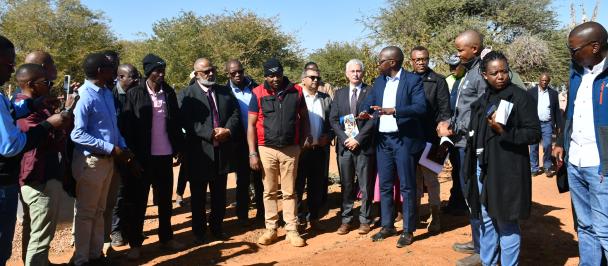Gaborone, Botswana – In a global first, policy-makers, development practitioners, government representatives, researchers and academics from Africa and from around the world are convening in Gaborone, Botswana to share policy options and strategies that will advance the eradication of poverty and further tackle inequality and exclusion within the context of the 2030 Agenda for Sustainable Development, focusing on the principle of “leaving no one behind.”
In recognizing that there are close linkages between poverty, exclusion and inequality, the two-day conference, under the theme; “Leave No One Behind: The Fight Against Poverty Inequality and Exclusion,” takes place from 20-21 March 2018, and provides a forum to assess the impact of applied strategies, accessing how the poor can be identified and what policies and pragmatic approaches can be implemented effectively, to benefit the poorest of the poor.
“A truly prosperous nation is one which provides for all of its citizens to enjoy dignified life. As a nation, we are committed to prioritizing eradication of poverty and this conference is timely as we are in the process of finalizing Botswana’s Poverty Eradication Strategy which will help us advance our efforts of taking our people out of poverty. It is my hope that recommendations and outcomes will contribute in shaping our implementation, ” said Botswana’s President, Lt. General Dr. Seretse Khama Ian Khama.
According to United Nations data, Africa’s GDP growth has been high, averaging 5 percent, above the global average of 3 percent per year, instilling optimism about the continent’s economic prospects since mid-2000. However, the growth has not been inclusive or equitable, and has made little impact on poverty and rates of inequality remain high.
Within this context, delegates at the Gaborone conference discussed how to fully realise the idea of Leaving No One Behind, which the UN said requires new ways of thinking and working together in partnerships, and taking on complex challenges, like exclusion and inequality.
Both local and international speakers at the conference focused on in-depth analyses of issues with a view that poverty is multidimensional looking at its impact in various sectors from agricultural investment to gender equality within the Botswana context. The overarching aim is to inform innovative policies for more inclusive growth.
Panelists at the conference emphasized the need to adopt multidimensional approaches to poverty elimination including addressing income inequalities, empowering women, narrowing down the gaps in health, education and access to infrastructure, as well as challenging prejudices and stereotypes which feed discrimination and marginalisation.
Speaking at the conference, the UNDP’s Resident Representative in Botswana, Jacinta Barrins, encouraged delegates to share what strategies have worked well so that countries can benefit from such experiences.
Moses Zangar, Jr. - Communications Officer UNDP moses.zangar@undp.org; Cell: +267 75 768 318
Ngele Ali – Communications Specialist UNDP ngele.ali@undp.org
Victor Burzlaff - Communications support UNDP victor.burzlaff@undp.org; Cell: +26772507957

 Locations
Locations



